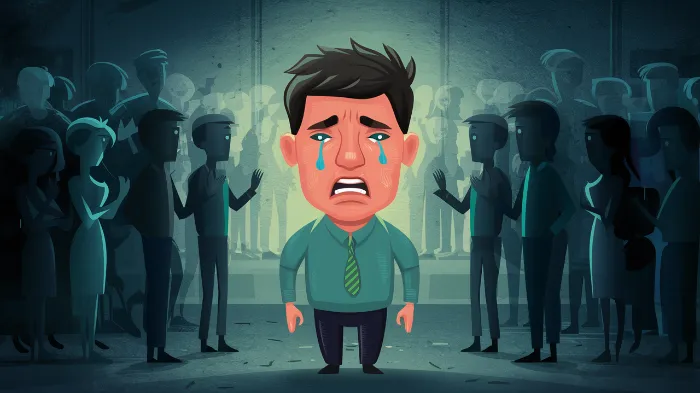
Are you a guy wondering if you're still a virgin? In today's society, there's a lot of pressure and confusion surrounding the topic of virginity, especially for men. With so much misinformation out there, it can be tough to know what really counts as “losing your virginity.”
Let's break down the myths and get to the facts about male virginity. Get ready to learn the telltale signs that you're still a virgin, and find out what really counts when it comes to sexual experience. By the end of this article, you'll have a better understanding of your own body and sexual history.
Exploring the Complexities of Male Virginity
| Topic | Description |
|---|---|
| Social Constructs and Stereotypes | Examining the societal expectations and stereotypes surrounding male virginity |
| The Psychological Impact | Understanding the emotional and psychological effects of male virginity |
| Recognizing the Signs | Identifying the physical and behavioral signs that may indicate male virginity |
| Common Misconceptions | Debunking myths and misconceptions about male virginity |
| The Truth Behind the Myths | Separating fact from fiction about male virginity |
| The Role of Society | Exploring the impact of societal pressure and expectations on male virginity |
| Navigating Intimacy and Experience | Addressing the challenges and concerns around intimacy and sexual experience for male virgins |
| Emphasizing Personal Choice | Encouraging a healthy and positive approach to sexual decision-making and personal choice |
1. Social Constructs and Stereotypes
When it comes to male virginity, there are many social constructs and stereotypes that can cloud our understanding of what it really means to be a virgin. From the idea that men should be sexually experienced to the stigma around male virginity, these stereotypes can have a profound impact on how we view ourselves and our sexual experiences.
But here's the thing: these social constructs and stereotypes are just that – constructs. They're not based in reality, and they don't define who we are as individuals. It's important to remember that everyone's sexual journey is unique, and there's no “right” or “wrong” way to experience your sexuality.
2. The Psychological Impact
The psychological impact of virginity can be significant, especially for men who feel pressure to “lose their virginity” or who are struggling with their sexual identity. The stigma surrounding male virginity can lead to feelings of shame, embarrassment, and isolation. It's important to remember that virginity is a personal and subjective experience, and there's no shame in waiting until you're ready to have sex. In fact, choosing to wait can be a sign of maturity and self-awareness. It's important to prioritize your own emotional and mental well-being, and to make sure that you're having sex for the right reasons.
On the other hand, some men may feel anxious or distressed if they believe they're still a virgin despite having had sexual experiences. This can be due to a lack of understanding about what counts as “losing your virginity,” or confusion about their own sexual experiences.
For more insights on navigating intimacy and personal experiences, explore our articles on how to get my girlfriend in the mood and how to impress a girl without getting friendzoned.
3. Recognizing the Signs
In the realm of dating and sex, the topic of virginity often comes with a myriad of signs and signals that may indicate whether someone has had sexual experiences. For males, certain physical indicators and behavioral clues can sometimes, but not always, suggest virginity.
Physical Indicators
Another physical indicator is the state of the prostate gland. During sexual arousal, the prostate gland produces a fluid that mixes with sperm to create semen. If you've never ejaculated before, your prostate gland may not have fully developed yet, which could be a sign of virginity.
Finally, some men may experience pain or discomfort during their first sexual encounter due to the stretching of the foreskin or the breaking of the hymen. However, these physical indicators can vary widely from person to person, and they are not always reliable or definitive. In the end, the only surefire way to know if you're still a virgin is to be honest with yourself and reflect on your own experiences and feelings. By understanding the physical indicators and combining them with emotional and mental cues, you can get a clearer picture of your own sexual history.
Behavioral Clues
When it comes to decoding male virginity, behavioral clues can be just as important as physical signs. Your emotional and social experiences can give you valuable insight into your sexual history and whether or not you're still a virgin. For example, if you've never felt the desire to pursue a sexual relationship or haven't experienced any emotional attachment to a partner, these could be signs that you're still a virgin.
Additionally, if you feel uncomfortable or unsure about sexual situations, this could also indicate that you haven't had any sexual experience yet. However, it's important to note that behavioral clues are not always foolproof. Everyone's experiences and emotions are different, and there's no one-size-fits-all answer when it comes to sexuality. That's why it's important to take a holistic approach to understanding your virginity status, considering both physical and behavioral clues.
4. Common Misconceptions
Misconceptions about male virginity are widespread, with societal and cultural narratives shaping the way virginity is perceived. Here are some common myths:
- Male virgins are childish or awkward: The belief that male virgins are more likely to be immature or socially awkward is a stereotype that does not take individual personalities into account.
- Male virgins are unattractive or less manly: The misconception that virgin men are less desirable or not “manly enough” can lead to feelings of inadequacy.
- Acne indicates virginity: A myth suggests that acne, caused by hormonal changes, is a sign of virginity, implying that sexual activity can clear skin conditions.
- Male virgins lack masculinity: The stereotype that virgin men are inexperienced and therefore, less masculine or competent in relationships.
- Virgin men are destined to be unsuccessful with women: The notion that virgins are fated to be unsuccessful in romance or sexual encounters.
5. The Truth Behind the Myths
Dispelling these myths is essential for understanding the reality of male virginity:
- Maturity is not defined by sexual experience: Virginity does not determine one's level of maturity or social capability. Many individuals naturally outgrow social awkwardness with age .
- Attraction is subjective: Virginity status is not a universal indicator of attractiveness. Personal preferences vary widely, and being a virgin does not inherently affect one's desirability.
- Acne is not exclusive to virgins: Acne can affect anyone, regardless of their sexual experience, and is more closely related to genetics, diet, and skincare routines .
- Virginity is not indicative of masculinity: Masculinity is not solely defined by sexual conquests or experiences. Qualities like character, integrity, and respect are far more significant.
- Virginity does not predict future relationships: Being a virgin does not doom an individual to relationship failures. With time and the right opportunities, people can form meaningful connections at any stage of their lives.
For further reading on navigating intimacy and personal experiences, check out our articles on how to get my girlfriend in the mood.
6. The Role of Society

The role of society in shaping our perceptions of virginity cannot be overstated. In many cultures, virginity is still seen as a symbol of purity and innocence, particularly for women. Men, on the other hand, are often expected to be sexually experienced and confident. These societal expectations can create a lot of pressure and confusion for both genders, leading to misconceptions and stigma around virginity.
As we explore the signs of male virginity, it's important to challenge these societal norms and redefine what virginity means in the modern world. By doing so, we can break down the stigma and create a more inclusive and sex-positive culture.
Media Influence
Media portrayal of male sexuality is a powerful force in defining societal standards. Often, the media depicts male virginity as something to be shed at the earliest opportunity, reinforcing the notion that sexual experience is a milestone of masculine success. This portrayal can be seen across various media forms, from movies to music, where male characters are celebrated for their sexual conquests.
The impact of such narratives is profound. They can shape how individuals view their own sexual journeys and can lead to feelings of inadequacy for those who do not conform to these expectations. The societal focus on male virginity can even reinforce toxic masculinity norms, contributing to self-doubt, insecurity, and anxiety .
Cultural Expectations
Cultural expectations regarding male virginity vary across different societies and communities. However, a common theme is the stigmatization of male virgins, particularly as they reach their mid-to-late teens. Virginity shaming is prevalent, and men who retain their virginity beyond what is considered “normal” by society are often labeled as “losers” by their peers .
This emphasis on male virginity as a negative trait can lead to harmful behaviors, such as a sense of entitlement, objectification of women, and perpetuation of harmful attitudes towards sex and gender roles . It's crucial to address these cultural expectations and provide a more nuanced understanding of sexuality and personal growth.
7. Navigating Intimacy and Experience
Navigating the landscape of intimacy and romantic experiences can be challenging, especially for those who may not have ventured into this territory before. While virginity is an individual experience that can manifest differently across various people, there are certain nuances in behavior that can be indicative of a male virgin.
Interpreting Nervousness
Nervousness in intimate settings can be a natural reaction and is not solely experienced by virgins. However, virgin men might display a unique form of nervousness characterized by a lack of confidence while interacting with women, potentially due to their lack of experience in romantic relationships . This can manifest in various ways, such as:
- Hesitation in initiating conversation or physical contact
- Awkwardness in responding to flirtation or sexual innuendo
- Overthinking reactions during moments that may lead to intimacy
Understanding these behaviors can be helpful, not only in recognizing the signs of virginity but also in fostering a supportive environment where individuals can express themselves without judgment.
Understanding Consent and Hesitation
Consent is a critical aspect of any intimate encounter, and understanding and respecting boundaries is non-negotiable. A male virgin might ask for permission more frequently while being physically intimate, reflecting their inexperience and desire to ensure comfort and consent . While this is a positive practice that should be normalized regardless of experience, it can also highlight their need for guidance:
- Uncertainty in knowing when and how to progress physically
- Shyness about touching intimate areas or reciprocating advances
- Seeking verbal confirmation before engaging in intimate acts
This level of caution, while commendable, may also stem from a virgin male's lack of familiarity with the cues and rhythms of a physical relationship.
Addressing Virginity Shaming
As we explore the signs of male virginity, it's important to address the stigma surrounding virginity shaming. No one should feel ashamed or embarrassed about their sexual history, whether they're a virgin or not. To combat virginity shaming, we need to create a culture of openness and acceptance around sexuality. This means having honest conversations about sex, challenging harmful stereotypes, and supporting each other's choices and experiences.
Resources like how to attract women using the law of attraction can offer guidance without pressuring individuals to conform to arbitrary milestones.
8. Emphasizing Personal Choice
When it comes to male virginity, it's important to remember that personal choice is key. Your body is your own, and only you can decide when and how to become sexually active. It's essential to respect your own boundaries and values, and not feel pressured by societal expectations or peer pressure. Moreover, the decision to engage in sexual activity should never be taken lightly.
It's crucial to consider the potential consequences, such as sexually transmitted infections (STIs) and unintended pregnancies. By taking the time to educate yourself about sexual health and practicing safe sex, you can make informed decisions that are right for you. Remember, there is no shame in waiting until you're ready to have sex. It's a personal decision that should be based on your own feelings and values, not anyone else's. So, take the time to reflect on your own beliefs and desires, and make the choice that's right for you.
FAQs Related to Male Virginity
1. What is the Definition of Male Virginity?
A: Male virginity is the state of never having engaged in sexual intercourse with another person
2. Can you Tell if a Man is a Virgin Just by Looking at Him?
No, you cannot tell if a man is a virgin just by looking at him. Virginity is a personal and private matter that cannot be determined by physical appearance alone.
3. Is there a “Right” Age to Lose your Virginity?
No, there is no “right” age to lose your virginity. Everyone develops at their own pace, and it's important to wait until you feel ready before engaging in sexual activity.
4. What are the Risks of Having Sex as a Male Virgin?
There are several potential risks associated with having sex, including sexually transmitted infections (STIs) and unintended pregnancies. It's important to practice safe sex and get tested regularly to minimize these risks.
5. Can I Still be a Virgin if I've Engaged in Other Sexual Activities?
Yes, you can still be a virgin if you've engaged in other sexual activities, such as oral or anal sex. Virginity is a subjective concept that can vary from person to person.
6. How can I Prepare Myself for My First Sexual Experience?
If you're feeling anxious or unsure about your first sexual experience, there are several steps you can take to prepare yourself. This might include talking to your partner about your concerns, practicing safe sex, and educating yourself about sexual health.
Conclusion
Ultimately, understanding male virginity is a complex and multifaceted issue that involves both physical and psychological factors. By recognizing the signs, debunking common misconceptions, and emphasizing personal choice, we can promote a healthy and positive approach to sexual health and decision-making.
It's important to challenge social constructs and stereotypes, navigate intimacy and experience with care, and recognize the impact of societal pressure on our sexual lives. By empowering ourselves with knowledge and understanding, we can make informed decisions about our own bodies and sexual experiences, free from shame or stigma.







